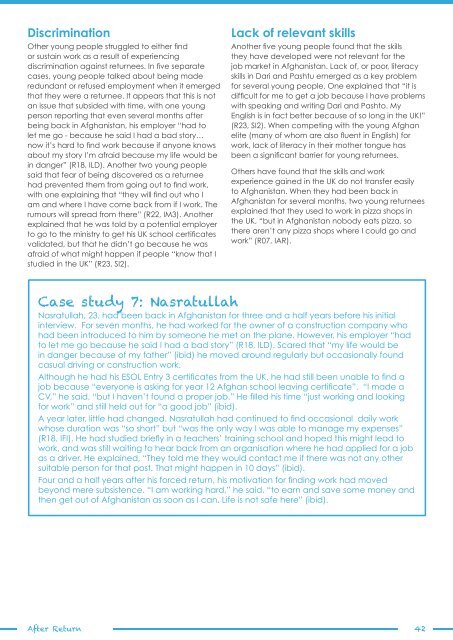After Return
After%20Return_RSN_April%202016
After%20Return_RSN_April%202016
Create successful ePaper yourself
Turn your PDF publications into a flip-book with our unique Google optimized e-Paper software.
Discrimination<br />
Other young people struggled to either find<br />
or sustain work as a result of experiencing<br />
discrimination against returnees. In five separate<br />
cases, young people talked about being made<br />
redundant or refused employment when it emerged<br />
that they were a returnee. It appears that this is not<br />
an issue that subsided with time, with one young<br />
person reporting that even several months after<br />
being back in Afghanistan, his employer “had to<br />
let me go - because he said I had a bad story…<br />
now it’s hard to find work because if anyone knows<br />
about my story I’m afraid because my life would be<br />
in danger” (R18, ILD). Another two young people<br />
said that fear of being discovered as a returnee<br />
had prevented them from going out to find work,<br />
with one explaining that “they will find out who I<br />
am and where I have come back from if I work. The<br />
rumours will spread from there” (R22, IM3). Another<br />
explained that he was told by a potential employer<br />
to go to the ministry to get his UK school certificates<br />
validated, but that he didn’t go because he was<br />
afraid of what might happen if people “know that I<br />
studied in the UK” (R23, SI2).<br />
Lack of relevant skills<br />
Another five young people found that the skills<br />
they have developed were not relevant for the<br />
job market in Afghanistan. Lack of, or poor, literacy<br />
skills in Dari and Pashtu emerged as a key problem<br />
for several young people. One explained that “it is<br />
difficult for me to get a job because I have problems<br />
with speaking and writing Dari and Pashto. My<br />
English is in fact better because of so long in the UK!”<br />
(R23, SI2). When competing with the young Afghan<br />
elite (many of whom are also fluent in English) for<br />
work, lack of literacy in their mother tongue has<br />
been a significant barrier for young returnees.<br />
Others have found that the skills and work<br />
experience gained in the UK do not transfer easily<br />
to Afghanistan. When they had been back in<br />
Afghanistan for several months, two young returnees<br />
explained that they used to work in pizza shops in<br />
the UK, “but in Afghanistan nobody eats pizza, so<br />
there aren’t any pizza shops where I could go and<br />
work” (R07, IAR).<br />
Case study 7: Nasratullah<br />
Nasratullah, 23, had been back in Afghanistan for three and a half years before his initial<br />
interview. For seven months, he had worked for the owner of a construction company who<br />
had been introduced to him by someone he met on the plane. However, his employer “had<br />
to let me go because he said I had a bad story” (R18, ILD). Scared that “my life would be<br />
in danger because of my father” (ibid) he moved around regularly but occasionally found<br />
casual driving or construction work.<br />
Although he had his ESOL Entry 3 certificates from the UK, he had still been unable to find a<br />
job because “everyone is asking for year 12 Afghan school leaving certificate”. “I made a<br />
CV,” he said, “but I haven’t found a proper job.” He filled his time “just working and looking<br />
for work” and still held out for “a good job” (ibid).<br />
A year later, little had changed. Nasratullah had continued to find occasional daily work<br />
whose duration was “so short” but “was the only way I was able to manage my expenses”<br />
(R18, IFI). He had studied briefly in a teachers’ training school and hoped this might lead to<br />
work, and was still waiting to hear back from an organisation where he had applied for a job<br />
as a driver. He explained, “They told me they would contact me if there was not any other<br />
suitable person for that post. That might happen in 10 days” (ibid).<br />
Four and a half years after his forced return, his motivation for finding work had moved<br />
beyond mere subsistence. “I am working hard,” he said, “to earn and save some money and<br />
then get out of Afghanistan as soon as I can. Life is not safe here” (ibid).<br />
<strong>After</strong> <strong>Return</strong> 42


